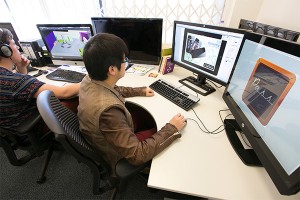 Coventry University’s internationally renowned Serious Games Institute, who are based at the Technology Park, has been working with researchers in Belgium and the Netherlands on a new ‘treatment’ to help children with ADHD (attention deficit hyperactivity disorder) and results of the research trial have shown a significant improvement in children’s behaviour.
Coventry University’s internationally renowned Serious Games Institute, who are based at the Technology Park, has been working with researchers in Belgium and the Netherlands on a new ‘treatment’ to help children with ADHD (attention deficit hyperactivity disorder) and results of the research trial have shown a significant improvement in children’s behaviour.
The treatment comes in the form of an Internet based game, called ‘Plan-It Commander’ which the research showed helps players develop skills to cope with daily life challenges, in particular, time management, organisation and social skills. Testing of the game involved 170 children, mostly boys, aged between eight and twelve years old. Parents and teachers of the children were asked to fill in questionnaires about the children’s behaviour, their capacity to concentrate on tasks, self-control and other factors, before and after ten weeks of playing the game. The results showed that the children with ADHD who played Plan-It Commander for ten weeks, around three times a week, alongside their usual treatment, was found to have significantly improved behaviour in the real world as reported by parents and teachers.
Pamela Kato, Professor of Serious Games at Coventry and co-author of the study, explained: “We were happy that the game proved to be helpful to young children with ADHD in addition to their current clinical treatment. While having fun playing the game, the research showed that they were improving daily life skills known to be important at school and also in their social lives.”
Lead author of the research, Kim Bul, joined the Serious Games Institute at the start of April this year, having previously been at the Yulius Academy (scientific department of Yulius Mental Health Care) and University of Applied Sciences in Rotterdam.
 Commenting on the new appointment to the Institute, Prof Kato welcomed Kim to the team saying: “We are delighted to welcome Kim to continue her research with us here in Coventry. The work she had been doing in the Netherlands is very exciting and fits in well with the strategic Serious Games research agenda we are pursuing in the UK.”
Commenting on the new appointment to the Institute, Prof Kato welcomed Kim to the team saying: “We are delighted to welcome Kim to continue her research with us here in Coventry. The work she had been doing in the Netherlands is very exciting and fits in well with the strategic Serious Games research agenda we are pursuing in the UK.”
Results of the trial of the game were published in the Journal of Medical Internet Research (JMIR) in February and concluded that use of the game could “…offer easy, accessible home treatment intervention for children with ADHD.”
Looking forward to working in Coventry, Kim Bul said: “My personal ambition is to combine clinical research and project management skills into projects that are related to health care and technology. I hope to contribute in making serious gaming more evidence-based by performing well-designed research. The field of mental health care is a challenging one, because integrating technology asks for a different mind-set. It is important to set up research that is valuable for practice, involves the target-users and values collaboration. The Serious Games Institute is a new dynamic working environment pushing health care to the next level.”


